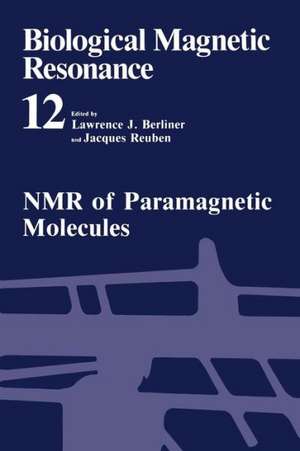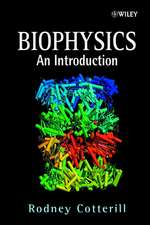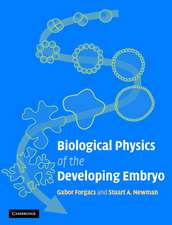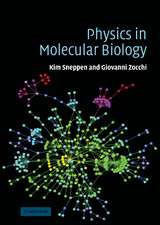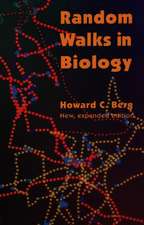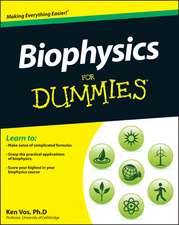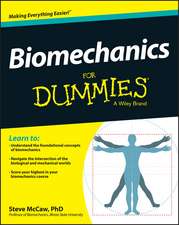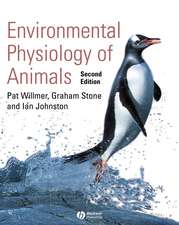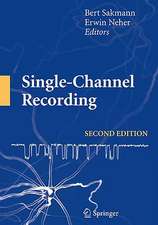NMR of Paramagnetic Molecules: Biological Magnetic Resonance, cartea 12
Editat de Lawrence J. Berliner, Jacques Reubenen Limba Engleză Paperback – 25 oct 2012
Din seria Biological Magnetic Resonance
-
 Preț: 388.72 lei
Preț: 388.72 lei - 18%
 Preț: 951.14 lei
Preț: 951.14 lei - 18%
 Preț: 1225.48 lei
Preț: 1225.48 lei -
 Preț: 391.02 lei
Preț: 391.02 lei - 5%
 Preț: 374.20 lei
Preț: 374.20 lei - 18%
 Preț: 958.07 lei
Preț: 958.07 lei - 5%
 Preț: 1416.09 lei
Preț: 1416.09 lei - 5%
 Preț: 1423.22 lei
Preț: 1423.22 lei - 5%
 Preț: 2126.73 lei
Preț: 2126.73 lei - 5%
 Preț: 1444.08 lei
Preț: 1444.08 lei - 5%
 Preț: 1426.71 lei
Preț: 1426.71 lei - 5%
 Preț: 1097.54 lei
Preț: 1097.54 lei - 5%
 Preț: 739.69 lei
Preț: 739.69 lei - 5%
 Preț: 402.11 lei
Preț: 402.11 lei - 5%
 Preț: 2123.06 lei
Preț: 2123.06 lei - 5%
 Preț: 1427.98 lei
Preț: 1427.98 lei - 15%
 Preț: 643.65 lei
Preț: 643.65 lei - 5%
 Preț: 1433.46 lei
Preț: 1433.46 lei - 5%
 Preț: 1412.99 lei
Preț: 1412.99 lei - 5%
 Preț: 1431.45 lei
Preț: 1431.45 lei -
 Preț: 387.96 lei
Preț: 387.96 lei - 18%
 Preț: 1689.69 lei
Preț: 1689.69 lei - 5%
 Preț: 720.84 lei
Preț: 720.84 lei - 5%
 Preț: 717.20 lei
Preț: 717.20 lei - 18%
 Preț: 891.65 lei
Preț: 891.65 lei - 18%
 Preț: 942.44 lei
Preț: 942.44 lei - 15%
 Preț: 642.83 lei
Preț: 642.83 lei
Preț: 376.22 lei
Preț vechi: 396.02 lei
-5% Nou
Puncte Express: 564
Preț estimativ în valută:
71.99€ • 75.36$ • 59.57£
71.99€ • 75.36$ • 59.57£
Carte tipărită la comandă
Livrare economică 07-21 aprilie
Preluare comenzi: 021 569.72.76
Specificații
ISBN-13: 9781461362500
ISBN-10: 1461362504
Pagini: 456
Ilustrații: XIII, 440 p.
Dimensiuni: 152 x 229 x 24 mm
Greutate: 0.6 kg
Ediția:Softcover reprint of the original 1st ed. 1993
Editura: Springer Us
Colecția Springer
Seria Biological Magnetic Resonance
Locul publicării:New York, NY, United States
ISBN-10: 1461362504
Pagini: 456
Ilustrații: XIII, 440 p.
Dimensiuni: 152 x 229 x 24 mm
Greutate: 0.6 kg
Ediția:Softcover reprint of the original 1st ed. 1993
Editura: Springer Us
Colecția Springer
Seria Biological Magnetic Resonance
Locul publicării:New York, NY, United States
Public țintă
ResearchCuprins
1 NMR Methodology for Paramagnetic Proteins.- 1. Introduction.- 2. Paramagnetic Relaxation.- 3. 1D Correlation.- 4. 2D Correlation.- References.- 2 Nuclear Relaxation in Paramagnetic Metalloproteins.- 1. Why do Nuclei Relax Faster in the Presence of Unpaired Electrons?.- 2. Correlation Time for the Nucleus—Unpaired Electron Coupling.- 3. Contributions to Nuclear Relaxation Due to Coupling with Unpaired Electrons.- 4. A Comment on Electron Relaxation Times.- 5. Electron Relaxation in Magnetic Exchange—Coupled Systems.- 6. Effect of Fast Relaxation on NOE Experiments.- 7. Effect of Fast Relaxation on 2D Experiments.- 8. General Strategy for NMR Analysis in Paramagnetic Metalloproteins.- References.- 3 Paramagnetic Relaxation of Water Protons: Effects of Nonbonded Interactions, Electron Spin Relaxation, and Rotational Immobilization.- 1. Introduction.- 2. Outersphere Relaxation.- 3. The Electron Relaxation Rate.- 4. Effects of Rotational Mobility on Solvent Relaxation.- References.- 4 Proton NMR Spectroscopy of Model Hemes.- 1. Introduction and Background.- 2. Proton NMR Studies of Various Iron Oxidation and Spin States of Porphyrins and Reduced Hemes.- 3. The Use of NMR Spectroscopy to Investigate Chemical Reactions of Model Hemes.- References.- 5 Proton NMR Studies of Selected Paramagnetic Heme Proteins.- 1. Introduction.- 2. Background.- 3. Assignments.- 4. Relative Attributes of Selected 1D and 2D Methods with CcP: Cytochrome c Complexes as Examples.- 5. Illustrative Applications.- References.- 6 Heteronuclear Magnetic Resonance: Applications to Biological and Related Paramagnetic Molecules.- 1. Introduction.- 2. 13C NMR of Paramagnetic Molecules.- References.- 7 NMR of Polymetallic Systems in Proteins.- 1. Occurrence and Role of Polymetallic Systems in BiologicalMolecules.- 2. Paramagnetism in Magnetically Coupled Systems.- 3. NMR Parameters in Exchange-Coupled Dimetallic Systems.- 4. Exploitation of Weak Exchange Coupling in Dimetallic Systems: Cu2M2 Superoxide Dismutase (M = Co, Ni).- 5. Exploitation of Strong Exchange Coupling in Dimetallic Systems: Fe2S2 Ferredoxins.- 6. Exchange-Coupled Polymetallic Systems.- 7. NMR of Fe4S4 High-Potential Iron-Sulfur Proteins.- 8. NMR of 2[Fe4S4] Ferredoxins.- 9. Cobalt(II)-Substituted Thioneins.- 10. Concluding Remarks.- References.- of Previous Volumes.
Notă biografică
Dr. Lawrence J. Berliner is currently Professor and Chair of the Department of Chemistry and Biochemistry at the University of Denver after retiring from Ohio State University, where he spent a 32-year career in the area of biological magnetic resonance (EPR and NMR). He is the Series Editor for Biological Magnetic Resonance, which he launched in 1979.
